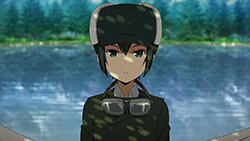 |
 |
 |
 |
 |
 |
 |
 |
 |
 |
 |
 |
 |
 |
 |
 |
 |
 |
 |
 |
 |
 |
 |
 |
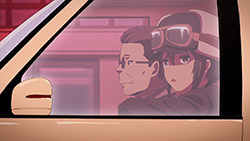 |
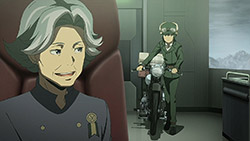 |
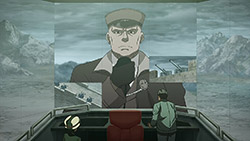 |
 |
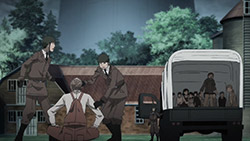 |
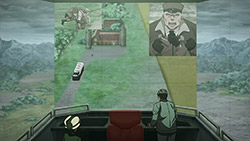 |
 |
 |
 |
 |
 |
 |
「迷惑な国」 (Meiwaku na Kuni)
“Bothersome Country”
Kino’s getting back on track this week with a country that has to run on a track to expend its high-energy consumption. This episode marks the first time in a while that Kino has encountered a contemporary nation. Much of the nations up til now had the pastiche of older periods like the Wild West or the Roman Colosseum, but the “Bothersome Country” has the aesthetic of a futuristic sci-fi nation with a closed ecological system like the Gardens from Final Fantasy VIII. For someone who has to shack up at rural destinations, the side of a lake, or unkempt dungeons, Kino is having a ball finally getting a room with fresh sheets and hot, clean water. A little too much of a ball, perhaps, but it is cute to see Kino finding solace in how luxurious the room is compared to a hammock.
The city Kino visits this time around is quite interesting as its not inherent right away what the issues are. The president and townspeople are friendly in a way that is more average than unnerving, everyone lives a relatively peaceful life, Kino is welcomed with open arms without any sense of hostility whatsoever, and they have the same taste in living the average modern life as many of us do. However, the moral quandary of the moving town comes not from the people, but the mechanics. The town’s treads are forced to move in a track because of the energy core that requires it to stay mobile, but in the process, it mows down anything in its path. This means that it needs to trample over ecosystems, fields, and occasionally towns in order to function. What’s fascinating is that it’s all presented as an unwanted, but inevitable effect of maintaining their city. The people running the mobile town find it regrettable that they are causing destruction with their town’s movement forward, and don’t find enjoyment in any of their destruction, but it’s just something they’ve grown to accept as the only way they can keep the town afloat.
This ethical concern comes out in full force when Kino’s stay coincides with the rare occasion when they have to steamroll through another village. Although the town placed a wall to make it easier to give anyone who tries to come in a hard time and the Bothersome Country is a peaceful nation, the episode takes note on how, from a moral standpoint, the Bothersome Country is still mowing through people’s homes and villages without any mind being paid towards the livelihoods that are being affected by their destructive path forward. The town’s general trying to defend his town, and outright shouting at the Bothersome Country for not having any empathy or understanding towards them makes it clear that while the moving town isn’t malicious or tyrannical, they are still ruthless in their willingness to charge through a village without permission.
An interesting aspect of the episode is how it gives Kino characterization by relating Kino’s personality and motivations with the town’s ethos. The first thing that the town’s supervisor says as he explains the second reason for moving about akin to Kino’s own desire to travel around the world, and experience anything they can along the way. Additionally, their ethics align similarly considering how Kino elects to ignore the pleas that the general has to have empathy on their town that they are plowing through. The rough-around-the-edges approach lends itself to explaining some of Kino’s actions previously such as letting the Colosseum town’s upper class fight each other for the crown or keeping a straight face as the townspeople from the town that can kill discuss their penchant for murder.
This was an interesting episode to think about considering how the ethical dilemmas within the Bothersome Country’s movement are similar to ideas that contemporary nations have within the past few decades. Many nations considered to be civilized are beyond the times of outright conquest and bloodthirsty colonization, but are still willing to risk the livelihoods of surrounding nations to maintain a stable country. Whether it’s agricultural exploitation or mining for limited resources in natural habitats, the most advanced and peaceful nations are also prone to the unfortunate effects of being careless about the effects their decisions have on the environment or people in other nations they keep in contact with. Kino no Tabi is a series that tackles the moral issues that governments, technology, and humanity in general face from a relatively neutral standpoint, and this episode makes this clear with Kino’s encounter with a troublesome nation that is still able to remain as harmonious and comfortable as any prosperous nation would be.

and again an Episode where Brother Death is following the MC.. All is resolved with a Gun shoot..
Kino went with the moving country for 5-10 days because she was unable to get through the plain country. The latter asked for Kino’s gun for right of passage. Kino refused. She also couldn’t find a way around that country (that’s what happened at the start of the episode, also explained at the end). That’s why she didn’t intervene much in favor of the militaristic country.
I think circumstances such as this or bad weather forces her to forgo her three-day rule, though she seems to stick to it as best as she can. I read stories sometimes where she stays a little longer, sometimes even less.
Metaphor. Crazy old bitch Merkel drives her insane ideals over smaller countries, telling them that either they wanted it, or they deserve it; and be sure to welcome the invaders once your wall’s down.
I wonder how the moving country handles waste. I like to think that it stops somewhere, takes a huge dump before moving on.
I assumed everything is recycled. It seemed like a closed-ecosystem to me, with the only thing they extrude being the excess heat from their generator.
I’d imagine it all either gets recycled through the system or there’s a waste management department in place for eradicating it with something like a costly incinerator, hence why energy consumption is astronomical enough for them to remove waste without further damaging the environment.
Either that or Kino wasn’t there during garbage day when they dump everything in a nearby ecosystem!
When I first read this story, I never really considered the moving country to be troublesome in a sense. Now, after reading this along with other reviews, I can understand why. In a sense, they were troublesome in that they were ruthless in going through a village, but given their circumstances, I don’t think they had any choice. They were obviously not going to get permission, and they can’t exactly stop for long periods of time. I don’t think that they lack empathy, they just focus on their needs while trying to minimize their effects and discomfort to others. Perhaps they could have gone around the country, though given how wide their wall is, that might take a while in itself. Initially, I thought that the moving country had no choice in the situation, and the large country got karma for their actions. Now, it’s hard to tell which country is right.
In regards to relating to Kino’s personality, given the circumstances she faced thus far or at least shown in the first two episodes, I kind of find it hard to feel empathy for the afflicted parties, the lone gunman and the rich citizens. It was their own situation that led to their circumstances, and Kino as a traveler can’t really interfere. Every country/town has its own customs and traditions, and travelers are just passing by. They can’t really interfere unless circumstances forces them to. Perhaps this is my flaw as a person, that I don’t really feel much for them. I think Kino does feel some empathy for others; though it doesn’t seem to show in these episodes, I do see it in some stories later.
Also, Kino has great bed hair!
Sorry, please open your Door. We need to travel trough your Home and while at it, get everything outside of our straight Line of Travel…
What you refuse? then we use our universal Door opener. Have a Nice Day
Well, here point 2 is the selfish request. Thy travel for the sightseeing.. Must it really be through someones territory? would it also not look nice if you avoid it?
Sure they can not Stop (or just for repairs), but they can at last drive where they go, right? or is this just straight forward? What will they do, if they reach Deep Water? or ground that do not carry their weight?
So Point 1 could be understandable, but point 2 is their “Sin”
If they would really be pacifists they would run in circles.. but then they do not see new worlds…
Also this kind of Country.. reminds me of the “Castle in the Sky” from La Puta…
I can see that considering that they aren’t malevolent or vicious in their intent. They are helpless as far as the direction they are going and try to make the most of it by trying to warn nations in front of them of their nation’s capabilities as they pass by. Nonetheless, there’s the moral gray area in how their nation operates that prevents them from being able to survive without hurting the environment or nations around them. That’s why “bothersome” is the most apt way of describing them as opposed to anything worse; their biggest weakness is how much power they have to destroy anything in its path despite having no intention to cause such destruction.
With Kino, there is a bystander affect on her behalf considering that she’s only a visitor, and doesn’t have much authority in the situation other than helping out. As a traveler, Kino’s only there to observe and continue to survive without lowering her guard.
Also, if you think about it, this is kind of how America was founded. It’s interesting to see how this relates to our countries and how they were founded. We behave similarly in some aspects in our society. I see this sometimes in businesses. Question is, do you think we can do better?
Human beings can always do better, the momment we give into our flaw we are doom.
It can easily be applicable towards businesses and Western societies. Most aim to be diplomatic and calm, but the systems and practices in place for law and authority push against the idea of avoiding the negative affects of their actions and policies, both domestic and abroad. It might take some time for society to shift into a better mindset where there is a push to avoid exploiting others around them, but it would take longer to reform more deeply rooted systematic forms of exploitation like with trade or resources.
The Native Americans, for the most part, behaved just like the Europeans, stealing other tribes lands and in some cases forming small and large empires. Both groups committed many atrocities. The fact that the Europeans were better at war does not make them worse than the natives. Yes, there were a few peaceful tribes but not many. It is good that we are moving to better behavior.
Kino’s author confirmed this anime is a new remake, with no connection to S1.
The anime is covering LN material voted by readers as their favourite stories in a 2015 poll.
http://www.crunchyroll.com/anime-feature/2017/10/09/what-stories-will-appear-in-kinos-journey
All stories are designed to be standalone.
I see, but are these Episode always “solved” with help of Guns?
https://randomc.net/image/Kino%20no%20Tabi/Kino%20no%20Tabi%20-the%20Beautiful%20World-%20the%20Animated%20Series%20-%2003%20-%20Large%2033.jpg
Yuuki Aoi, channeling the Fremy Speeddraw in her once again. 😛
Got a serious Mortal Engines’ Traction City vibe from this episode.
https://randomc.net/image/Kino%20no%20Tabi/Kino%20no%20Tabi%20-the%20Beautiful%20World-%20the%20Animated%20Series%20-%2003%20-%20Large%2027.jpg
that radio guy keep dropping it multiples time – priceless
https://randomc.net/image/Kino%20no%20Tabi/Kino%20no%20Tabi%20-the%20Beautiful%20World-%20the%20Animated%20Series%20-%2003%20-%20Large%2028.jpg
why does it take a shape of dome (
condom) is penetrating almost anything with thatDo you think they ever stop to enjoy the places they pass through (or to trade at least)?
I read a translation of the light novel chapter for this episode. The moving country asks if there isn’t a way around or a better path.
But the do mention that in the episode when talking to the general, they don’t ask directly but they do explicitly say that they looked and found no other way around.
Two wrong don’t make a right. The Wall country expanded its borders in order to extort trade and travel by forcing people to pay them to cross their lands. I a way both countries were running over someone. To Kino, who had her way blocked, she was going to side with the travelers vs those who impeded travelers. That and Kino’s feeling for the kids got Kino shooting.